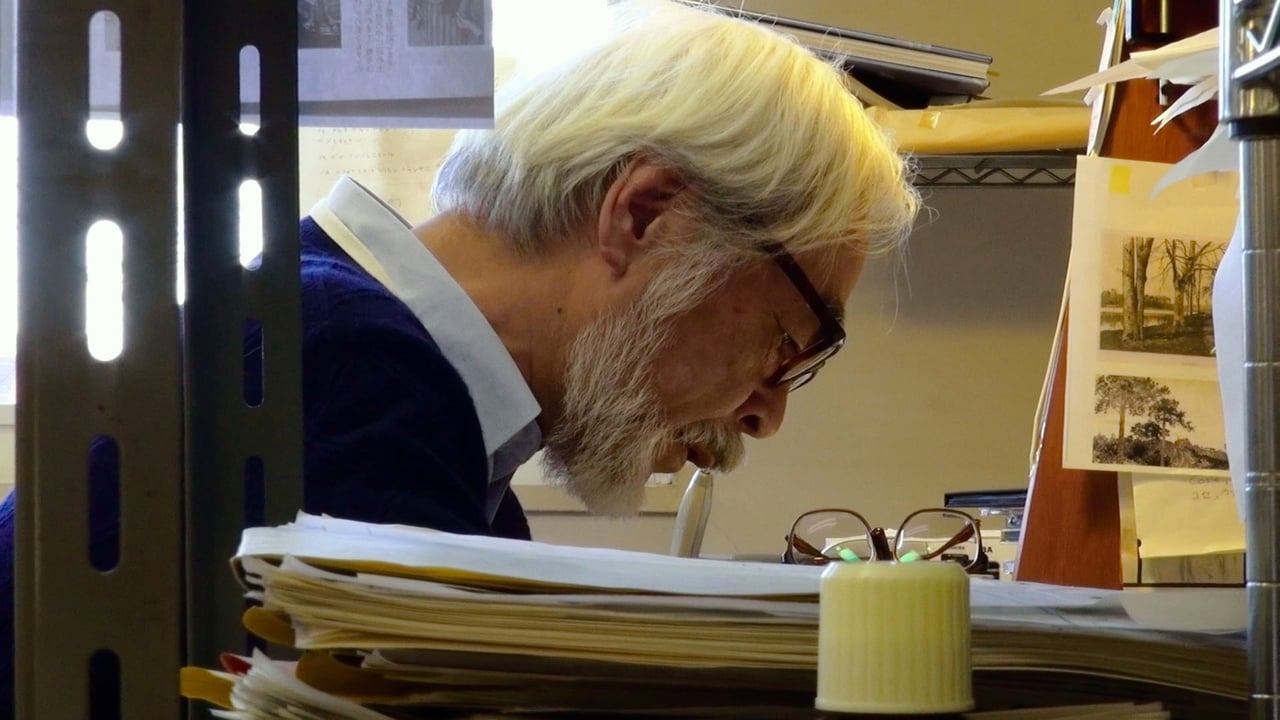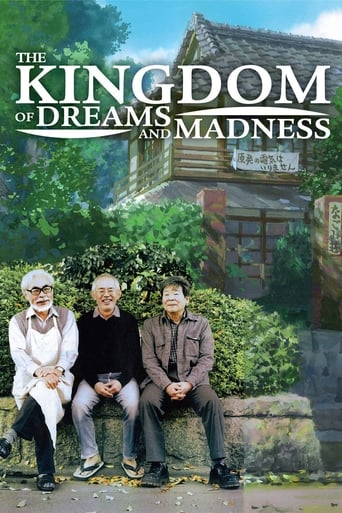

The Kingdom of Dreams and Madness stays true to its name, offering a deep, touching, and realistic insight into the dreams and madness rampant in the production of Hayao Miyazaki's 'last' masterpiece, 'The Wind Rises'. To the surprise of many, the documentary doesn't dive into Studio Ghibli's rich heritage. With the exception of Miyazaki's partnership with Isao Takahata, we learn little to nothing of his life, family, education, and works. Even less documented is the production process from concept to film. If you're looking for structure, biopsy, behind the scenes, and feel-good tangents, this is not it.'Hello, please allow me to observe you working.' - the hanging note in the opening scenes summarizes the film's 'unobtrusive' approach. Unlike the typical American documentary, the Kingdom of Dreams and Madness drops the head-on interviews, spotlights, and overall busy atmosphere, in favour of capturing the routine of the team at Ghibli. Lacking the excitement and glorification one would expect from such a talented budget, the already 120 minute long time line feels slow. Watching sometimes feels as tedious as the animation process itself. Though, the result is a treasure: an unbiased look at what it means to be, and work for Miyazaki; the crew's timid involvement allows Miyazaki to open up, giving us an unexpected glimpse into what goes on in his head, and leads to a touching, raw, understanding of 'the suffering of film making'.There's one thing to take away from The Kingdom of Dreams and Madness: Miyazaki's philosophy. In a place where we expect happiness, motivation, and fusion, we instead find cynicism, bitterness, frustration, and chaos. Albeit delivered politely and comically, Miyazaki's words are not what we expect to hear. Through rants about bowing to not being able to draw A6M Zero's, Miyazaki channels his surrender within the modern world. 'Today, all of humanity's dreams are cursed somehow'. You can't create your own happiness, because you cannot control how others see your creations. 'The notion that one's goal in life is to be happy, that your own happiness is the goal... I just don't buy it.' The Kingdom of Dreams and Madness is nothing you would expect, and everything you need to know. At first hard to follow, it quickly immerses you in a philosophical trance. Be sure to leave time to ponder at this solid 10.
... View MoreI was majorly disappointed in this documentary about legendary animator Hiyao Miyazaki and his famous Studio Ghibli (that produced such iconic animated films as My Neighbor Totoro, Kiki's Delivery Service, Spirited Away, Princess Mononoke to name a few.First let me say that I near-worship Miyazaki. When I first found his work in the mid-90s, I had a fantasy of flying to Japan, prostrating myself at the front door of Studio Ghibli and begging for a job as the lowest underling -- sweeping floors, making tea -- just to be near the artists & their work. OK, a silly mid-life fantasy. But still. I adored them, and I still consider Miyazaki the most pre-eminent animator of the last 35 years, and Studio Ghibli makes Disney, Pixar and Dreamworks look a bit lame (his hand drawn animation blasts their computer graphics into space dust).But this documentary is the epitome of bad documentaries. It's fragmented. It's boring. If you have not seen most of films, it won't even make sense. They give no framework for understanding WHO he is or why he is important (or why his presumed retirement is an irreplaceable loss for the world of animation). A good documentary could be on rice farmers in the Sub-Sahara, and be seen by someone who has never heard of them, and actually make you understand and appreciate the subject. This documentary does the OPPOSITE -- it took someone and something I absolutely adore and revere, and made them more boring than math homework.For starters, the film is in Japanese, and they thought so little of it as to not dub any of it. It's grueling to watch. (There is more footage of the studio's adorable snub-tailed cat than Miyazaki!) The subtitles are so poorly done, you often cannot read them against the backdrops. This is inexcusable. It would have taken very little effort to have the narration dubbed into English.About all I got out of this (besides meeting their cat!) was that the studio itself is interesting - - a light filled and charmingly modest space. We also see what I THINK was Miyazaki's home (they do not make it clear) and again, it's a large and homey space, but nothing fancy. I imagine if one toured the home of John Lassiter or Brad Bird or any Disney exec, you'd see something on an entirely different scale of bling. You get to see nature surrounding Studio Ghibli and the rooftop garden, which is a glimpse into the natural beauty often reflected in the films. That much is nice. But there isn't too much of it.Most of the film is the rather dark and depressing personality of MIyazaki. Good thing I never became his gofer/tea girl, because I thought he would be a warm, grandfatherly person full of light and imagination. Ummm....not. He's an "end of the world" type, and strikes me as depressed. His colleagues and co-workers come off as non-entities (though I am sure they do important work). I was surprised not to see evidence of his family (besides the son, Goro, whom Miyazaki makes painfully clear is not talented enough to take over the studio). Supposedly Miyazaki based the characters of May, Seitsuke, Kiki and San on his granddaughters. They must be young adults by now. It would have been nice to have seen them or at least some photos of his family. (If he is married, they do not mention his wife.)I have probably seen films like Totoro and Kiki 10-12 times each, if not more and remain fascinated with all Miyazaki's work. I like some better than others, but all of them form a rich cultural treasure chest. THIS documentary -- I fell asleep somewhere around the last third. FELL ASLEEP. It is unbelievably dull. How you can make such a fascinating person dull is beyond me.
... View MoreBefore I watched this documentary about Studio Ghibli and its creator, Hayao Miyazaki, I knew very little about the man but loved his films. Now, after having seen this movie, I kind of wish I hadn't. After all, in my mind, I assumed that Ghibli must have been some sort of magical place where fun and fantasy skipped hand in hand. However, it turned out to be a very different sort of film--a bit slow and amazingly downbeat!The style of this documentary by Mami Sunada is rather free-form. It does not offer a chronological discussion of the history of Miyazaki or the studio. Instead, it just lets the staff of Ghibli (mostly but not exclusively Miyazaki) talk and there isn't much in the way of structure. At times, you hear folks talk about some of this history, but people wanting this sort of film should look elsewhere. So much of the film consists of behind the scenes discussions--some of which really surprised me. If Miyazaki didn't like someone or their work, he said so without being particularly diplomatic about this. And, to be fair, some of his employees talked about him in less than glowing terms and felt free to do so! But what really got me was how the man seemed to have an extremely depressive personality. It's not going out on a limb to draw that conclusion, either, with his comments throughout the film such as "I don't ever feel happy in my daily life" and "filmmaking only brings suffering". Wow...kind of a downer, don't you think? He also very candidly said that he didn't think the studio would survive after his death or with his son in charge. Ouch.So is this documentary any good? Well, it all depends. If you want honesty, and too often biopics are incredibly dishonest, this one is honest...showing Miyazaki warts and all. However, if you want to enjoy a documentary or feel uplifted, you'd best try something else.
... View MoreWonderful and insightful movie about Hayao Miyazaki's life and work at the famous Studio Ghibli, responsible for animation classics such as "My Neighbor Totoro" and "Spirited Away", during the making of Oscar-nominated "The Wind Rises", his most personal work to date and presumably the last. The documentary offers many personal views from the director, with plenty of photographs and archive footage, and also incredible shots of the strenuous process of making traditional hand-draw animation. At 72 years old, and facing a possible retirement, Miyazaki still manages to instill hope for more to come. Beautifully done.
... View More